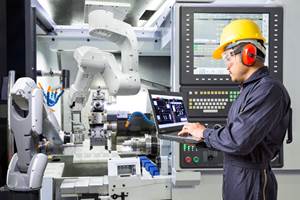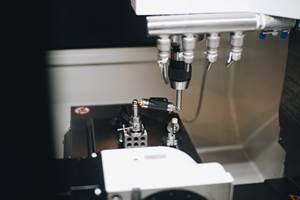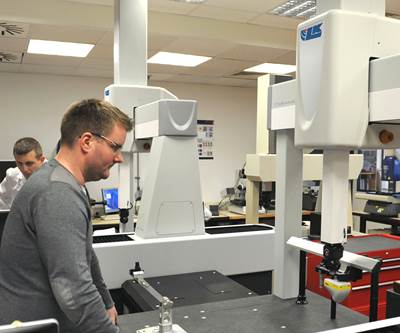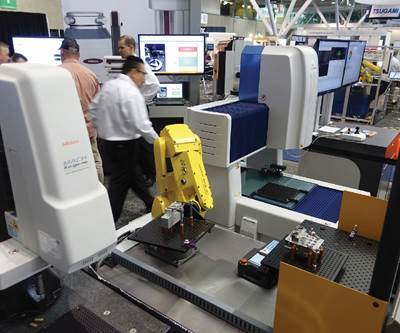Ease of Use Is Key for Shopfloor CMM Inspection
This San Diego manufacturing company simplifies its inspection processes with equipment from Keyence.
Share




Autodesk, Inc.
Featured Content
View More
ECi Software Solutions, Inc.
Featured Content
View More
Hwacheon Machinery America, Inc.
Featured Content
View More


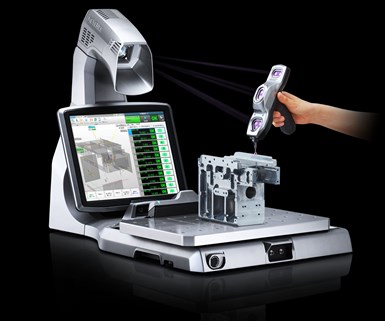
The XM series is a portable, shopfloor CMM designed for easy and accurate 3D and GD&T measurements and CAD comparison.
Although Flying J Machine has a coordinate measuring machine (CMM), company President Jay Hegemann found himself in a predicament. “With CMMs, there’s usually one guy who knows how to run it,” he says. “And unless you have a large shop where it’s being used all the time, I think most CMMs end up like mine — expensive dust collectors.”
Since this was the reality for his shop, Mr. Hegemann paid particular attention when he received an email about Keyence’s XM series handheld probe CMMs. After bringing in a specialist for a product demo, Mr. Hegemann ordered an XM and has been reaping the benefits of a simplified inspection process ever since.
A Self-Taught Machinist
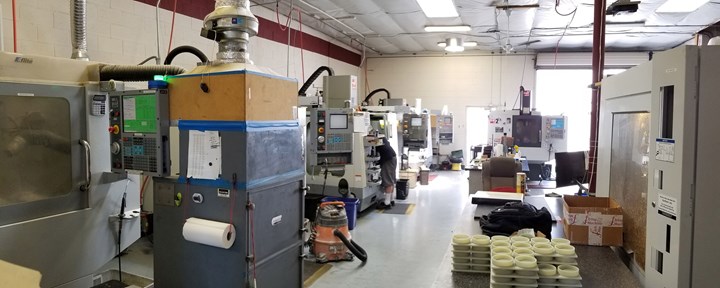
This is the shop floor of Flying J Machine, where the XM series can be used by machinists right next to mills to quickly spot-check or fully inspect their parts.
Flying J Machine has been in business since 2000. The Escondido, California, company has nine employees, nearly 8,000 square feet of floor space and a variety of modern equipment. This includes several Haas CNC machining centers and lathes, a Mitsubishi wire EDM, laser cutting equipment and a small-hole EDM. Much of its work serves oceanographers — mostly instruments that measure water properties — but the shop also has customers in the semiconductor, communications and defense industries.
Mr. Hegemann is self-taught. While working in his father’s small product development company during his early 20s, Mr. Hegemann convinced his father to buy a CNC knee mill. Over the next six months, he read the manual and began making prototypes for his dad. When a local business asked him to machine some parts, he jumped at the prospect. Since then he’s gone off on his own, continuing to add capabilities to his growing company, even though he’s often had to stay up all night learning a new skill or mastering a machine tool.
No Need for Training
One such capability is the aforementioned CMM. According to Mr. Hegemann, the problem with that equipment is that it uses PC-DMIS, which requires a fair amount of training to learn. “So you send someone out to class thinking they’ll train everyone else when they get back, but then that person quits, or if he does train other people, those people use it so seldom that they forget how,” he says.
Because of this, it was critical for Mr. Hegemann to find measuring equipment that anyone could use without the need for complicated programming and extensive training. When Keyence’s local XM specialist brought the system in for a demonstration, Mr. Hegemann knew a good thing when he saw it. “The writing was on the wall,” he says. “The XM is fast, accurate and easy to use. I ordered one that day.”
The Keyence XM series CMM is small enough to fit on a bench, but thanks to its movable stage and handheld probe, it can measure large and complex parts. According to the company, it has a simple user interface with an extensive but easy-to-understand list of measurement options. Tools such as lines, points, circles and planes are displayed on the screen, walking the user through the measuring process while providing geometric dimensioning and tolerancing (GD&T) functionality, virtual figures, statistics and trend analyses, deviation display, and other advanced features.
Mastering Measurement
Mr. Hegemann says the XM is simple enough to use that his company skipped the training on offer from Keyence and got right to work. Everyone in the shop has since gained the ability to check their own parts with just a few minutes of instruction. “It’s so much better than our old CMM,” he says. “You just walk up, click on the appropriate icon, and you measure a bore, the distance between holes, flatness, whatever. I can’t really say how much time it saves, because it’s more a case of something that is actually being used compared to something that’s not being used.”
To those who may be skeptical of the handheld probe (as Mr. Hegemann was, initially), he says the XM is incredibly accurate. “I wasn’t sure at first, so I grabbed a 1.4375-inch ring gage, which is ground to within 50 millionths (0.000050 inch), and started checking. Every time I measured it, the Keyence XM was within a tenth (0.0001 inch) of what it was supposed to be. You don’t have to be super careful; you just hold the probe to the surface, apply a little pressure, hit the button and move on to the next point. It’s the real deal.”
Related Content
The Many Ways of Measuring Thickness
While it may seem to be a straightforward check, there are many approaches to measuring thickness that are determined by the requirements of the part.
Read More6 Machine Shop Essentials to Stay Competitive
If you want to streamline production and be competitive in the industry, you will need far more than a standard three-axis CNC mill or two-axis CNC lathe and a few measuring tools.
Read MoreTurning Fixed-Body Plug Gages Inside Out
Fixed-body mechanical plug gages provide fast, high-performance measurement for tight-tolerance holes.
Read MoreBallbar Testing Benefits Low-Volume Manufacturing
Thanks to ballbar testing with a Renishaw QC20-W, the Autodesk Technology Centers now have more confidence in their machine tools.
Read MoreRead Next
New CMMs Gather More Data, Faster, for Automotive QC Department
Continental’s single-touch-probe CMM was bogging down quality control and limiting the information the company could glean for safety inspections. Two Altera CMMs from LK Metrology cut cycle times and increased insight.
Read MoreBuying a Coordinate Measuring Machine: CMMs Past and Future
While there has been much speculation that CMMs are becoming obsolete, the opposite is true.
Read More













.png;maxWidth=150)
















.png;maxWidth=300;quality=90)







